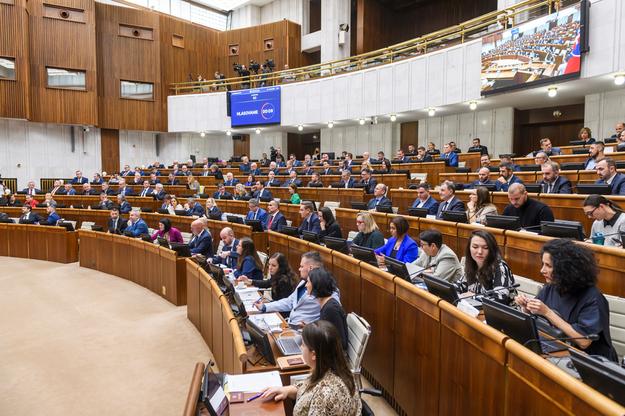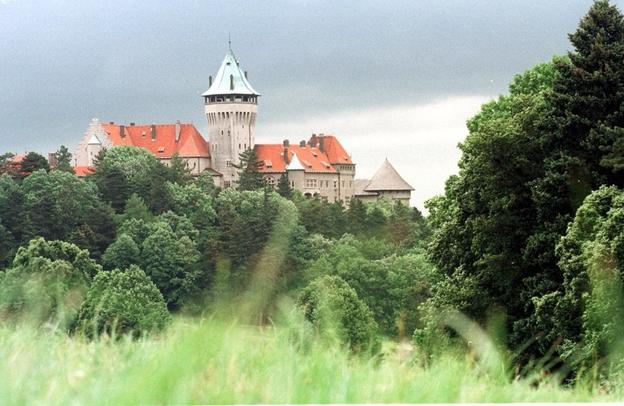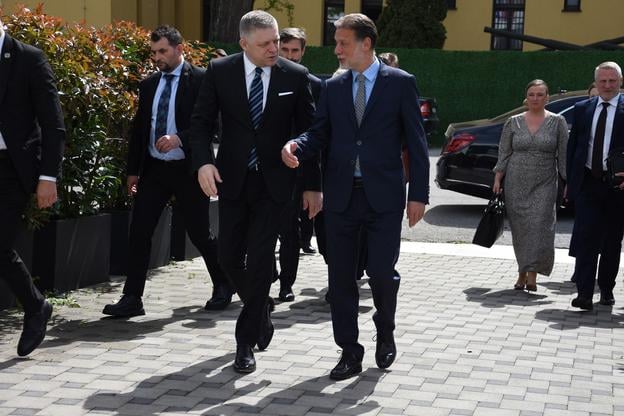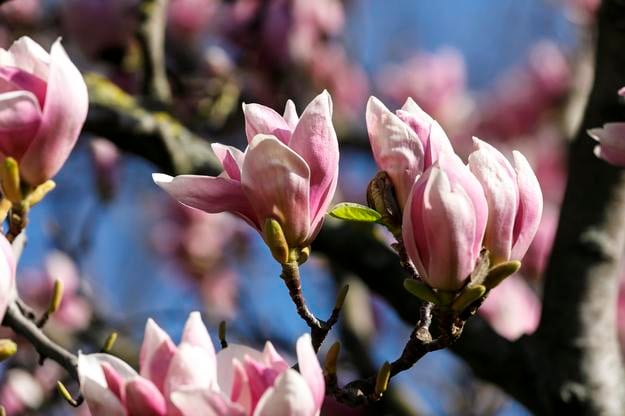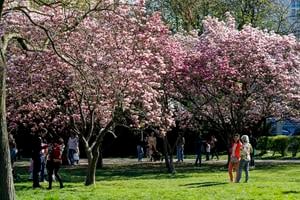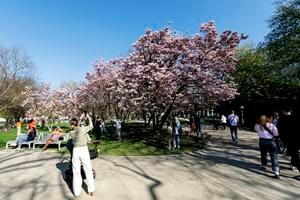Good evening. Here is the Wednesday, April 16 edition of Today in Slovakia - the main news of the day in a few minutes.
The law on NGOs approved
On Wednesday, the Slovak parliament passed what activists and civic organisations call "the Russian law" – as well as a frontal attack on the foundations of democracy in Slovakia.
Earlier in the day, the parliament approved a motion saying that the amendment is no Russian law and in fact follows European standards and the goal is transparency. Nevertheless, according to the Sme daily, coalition SNS chair Andrej Danko admitted that he talked to Russian officials about the law.
The coalition did not hear out Michael O'Flaherty, the Commissioner for Human Rights of the Council of Europe, who earlier in April expressed concern about the law and called on the MPs to not approve it.
The law still needs to be signed by President Peter Pellegrini. If he does, it will come into effect on June 1. Civic organisations as well as opposition parties are urging him not to do so.
What happened: The coalition floated the idea for more than a year. First, SNS wanted to label certain NGOs as 'foreign agents'. This then changed to 'organisations with foreign support', then to 'lobbyists' - something O'Flaherty himself criticised. Coalition Smer and SNS recently agreed to a compromise proposal by Hlas, which dropped the lobbying part as Hlas wants to define it in a separate law. Although the third reading of the amendment was limited to 12 hours, Speaker Richard Raši still ended it earlier, not giving more than 40 MPs the opportunity to speak. MPs had received the extensive 20-page amendment proposal from Hlas just on Tuesday afternoon. According to opposition SaS MP Ondrej Dostál, very little of the original proposal remained. And even though it was approved in the end, SNS and Smer MPs called the law 'toothless'.
What the law introduces: NGOs are to prepare a transparency report and to make information on the management of public funds available. According to the amendment, non-profit organisations, foundations and associations with an annual income of over €35,000 will be required to submit a transparency report. The report should include information about individuals who have donated more than €5,000 to the organisation during the year. According to Via Iuris, written this way the law may interfere with the right to privacy. Such an obligation could discourage donors from supporting organisations. The part on the obligation to publish the names of donors and members of the bodies of organisations remained unchanged.
What the opposition says: The coalition wants to use this law to penalise, harass and punish citizens for being active in the NGO sector who in many areas supplant the state, the MPs say, adding that the aim is to persecute NGOs that check the government. "They keep repeating how much they value 'good' NGOs that do social or charity work, and that only 'bad' NGOs get in their way. That is, those that are critical of the government. However, this Russian law affects everyone, even mothers who use their NGOs to provide a better life for children with health problems," said Progressive Slovakia MP Lucia Plaváková. Opposition MPs also want to turn to the Constitutional Court.
What NGOs say: According to the Zastavme Korupciu (Let's Stop Corruption) foundation, the names of the donors are to be disclosed even if they do not wish so. It doesn't matter whether they donated 1 cent or €5,000. This may be in conflict with the constitution and the right to privacy. The amendment also also brings more bureaucracy and high liquidation fines. According to the Mier Ukraine (Peace to Ukraine) initiative, which has held several anti-government protests in recent months under the banner 'Slovakia is Europe', the president several times said he did not understand why anyone would have doubts about Slovakia's anchoring in Europe. The initiative now says he has a chance to prove it and not sign the law. "Signing the Russian law means the beginning of the end of our democracy," the initiative said in a statement.
What the president says: According to the Presidential Office, Peter Pellegrini wants to thoroughly understand the amendment before making a decision whether to sign it.
MORE STORIES FROM THE SLOVAK SPECTATOR WEBSITE
HATE SPEECH: Police detains ankle monitor wearing extremist Daniel Bombic who reportedly has continued his criminal activities.
SPORT: The HK Nitra ice-hockey team has yet to prevail over their rival HK Košice team in Slovakia's top league finals. This year they have their sixth chance.
HEALTH CARE: A woman kills two cockroaches in two days in Bratislava's University Hospital. She asks what would health minister or government officials do if it was their child or wife in the hospital.
BAD WEATHER INCOMING: A storm within: Crisis at Slovak weather agency could jeopardise air safety, potentially forcing the closure of Slovak airspace.
If you like what we are doing and want to support good journalism, buy our online subscription with no ads and a print copy of The Slovak Spectator sent to your home in Slovakia. Thank you.
FEATURE STORY
Slovak singer at Eurovision, but not for Slovakia
Slovak singer Adam Pavlovčin, also known as Adonxs, will represent the Czech Republic at the upcoming Eurovision. He cannot represent Slovakia because the country does not participate in the competition.
"It is quite common to represent another country," he says in an interview, in which he talks about how he is preparing, what he expects, and also about the attacks on minorities.
EVENTS FOR THE NEXT FEW DAYS
Easter at castles
Fancy spending the upcoming holiday at a castle? If that is the case, why not head to one of several castles in the country for a special Easter programme? In addition to guided tours, you can look forward to a rich accompanying programme, including painting decorated eggs, crafts, animals and egg hunts. Among the sites are the picturesque Smolenice Castle, Beckov Castle and Čachtice Castle.
Meanwhile, Bratislava Castle will play host to a market of times long gone, showcasing how people in the Middle Ages lived, worked and what they ate. Easter-themed products can be had as well.
IN OTHER NEWS
In the next two weeks, additional office hours will be added to all departments of the Foreigners' Police across Slovakia. Without prior reservation, foreigners will be able to have their applications for temporary residence for the purpose of family reunification, for permanent residence for five years processed on Thursday, April 24, from 08:00 to 15:30. In addition, applications for renewal of temporary residence for the purpose of family reunification and applications for permanent residence for five years will processed on April 29 during the same time, except at the Nitra department. (TASR)
During his official trip to Croatia, PM Robert Fico (Smer) called on his Croatian counterpart Andrej Plenkovic to support the renewal of natural gas transit through Ukraine. Fico also thanked him for the possibility of receiving liquefied natural gas via terminals on the Croatian island of Krk. In the Slovak PM's view, his visit to Croatia confirms the excellent relations between the two countries. (TASR)
In addition to checks related to the fight against foot-and-mouth disease on the border with Slovakia, Austria has also extended border checks related to illegal migration for another six months. Austria is carrying out stationary checks, as well as mobile checks around the border. According to Austrian Interior Minister Gerhard Karner, the measure has significantly reduced illegal migration, and the goal is to reach zero. (TASR)
President Peter Pellegrini vetoed an amendment to the law on prosecutors, asking the MPs to rework it. The president proposes scrapping the idea of a special after-service pension for a general prosecutor. Instead, Pellegrini suggested they could be granted a pension after serving the whole term in office. The proposal was passed in March and currently applies only to the incumbent General Prosecutor Maroš Žilinka. The opposition has warned that the coalition may have intended this to motivate Žilinka to make room for a candidate they would elect to serve for seven years – throughout this and the next parliamentary term. (TASR)
Honeywell Safety Products Slovakia will end production in Partizánske, western Slovakia, this autumn. Currently, it is gradually laying off the remaining 137 employees. The decision to move production from Partizánske outside Europe was made in 2022, the company cited high labour costs as the reason. (TASR)
WEATHER FOR THURSDAY: Expect mostly cloudy skies, with occasional showers and storms. Daily temperatures will rise to between 22°C to 28°C. Level 1 wind warning in the western-most districts, several southern ones, and be careful if you happen to go to mountain ranges in central and northern Slovakia as well. (SHMÚ)
APRIL 17 NAME DAY IN SLOVAKIA: Rudolf, Rudolfa
Thank you for subscribing and reading. It means a lot to us.
P.S. If you have suggestions on how our news overview can be improved, you can reach us at editorial@spectator.sk.
Follow The Slovak Spectator on Facebook, LinkedIn and Instagram(@slovakspectator).


